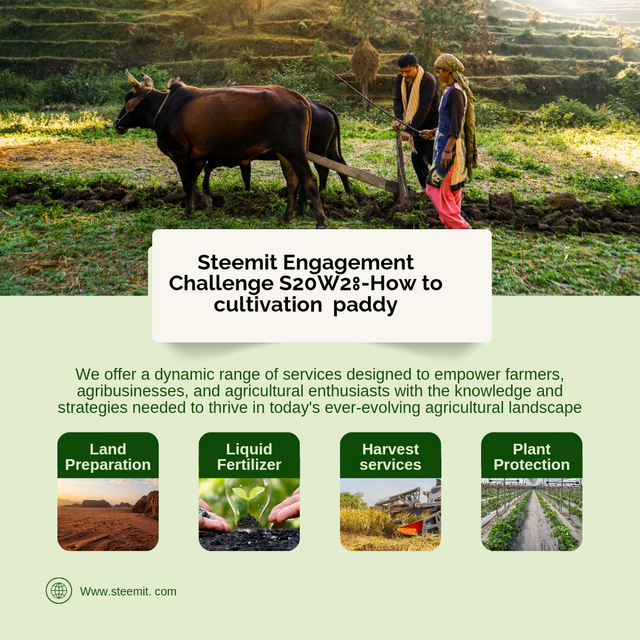"SEC | S20W2: How to cultivate a paddy"
 |
|---|
Hello Steemian!
Welcome to the Steemit engagement Challenge for season 20, week 2. First of all, I thank steemitblog. I never imagined that agriculture would get a chance to be highlighted in a place like steemitblog. I want every steemit user to learn about agriculture on this platform like web development, programming, and systems. Because if the future generation is not taught the correct knowledge and hands-on agriculture, it can have a bad effect. Agriculture will also play an important role in filling our food base. Rice is eaten as the main food in different countries of the world. So today's talk has been selected:-How to cultivate paddy.
|
|---|
We know that rice cultivation has been playing an important role in the world economy since ancient times. Rice is the main food grain in many countries of the world, including Asia, Africa, and Latin America, and it is at the top of the food list of people in many countries of the world. We are particularly in need of donations in Asian countries such as China, India, Bangladesh, Thailand, and Indonesia, major rice producers. Through the cultivation of rice, these countries contribute a lot to the export sector as well as agriculture. We know well that rice farming is very effective in strengthening global food security and rural economies. It also serves as a source of livelihood for farmers, laborers, and many people involved in this.
|
|---|
Different types of rice are cultivated in different countries of the world including Bangladesh. The main rice of Bangladesh are Bri rice 16, Bri rice 29, 29 Jirasail, etc. Almost the same rice is grown in India and Bangladesh. China is the first rice-producing country in the world. They cultivate Indica and Janopica rice. Indonesia plays a major role in rice production in the world. Indonesia's black rice has become known in all countries of the world. Also, Venezuela, a country famous for its oil production, produces some good quality rice that we fail to cultivate in South Asia. Those rice are Indica rice and Outcrop rice. Rice is cultivated in almost all countries of the world except a few countries. So I am giving importance to rice cultivation and today we have this competition.
|
|---|
Rice is rich in nutrients which is used all over the world. It contains almost all types of nutrients. It can be said that Nutrients that come from rice fulfill all our nutritional needs. The main vitamins that can be obtained from rice are sugars, vitamins, fats, all vitamins B1 to B3, etc. Also contains fiber and antioxidants. So we should all learn to grow such a nutritious whole food. That is why we have selected the paddy cultivation method in the 2nd week.
|
|---|
I want all the students who are interested in agriculture to visit the crop fields and thoroughly inspect them. They should observe the current condition of the crops. I believe in hands-on work. I want those who participate in this competition to go to the fields, either on their own or with the help of their fathers if they are farmers, and learn what is needed for rice cultivation and how to identify crop pests. This will make it easier for them to answer the questions. Our primary goal is to teach students how to cultivate rice properly. Our main goal is to bring the importance of agriculture to all users of Steemit. We know that one of the countries on our Steemit platform is Venezuela where there is very little rice cultivation. We want them to understand this method of rice cultivation and use this idea later. We observed that some regions or countries may not have paddy grown in their countries. However, we have made provisions for everyone. We have other gains with similar cultivation methods, as seen in paddy cultivation. Now, students are now free to pick up these other grains and still respond to the same questions asked above.(Wheat, Barley, Millet, Sorghum,Teff, Corn, etc.)
contest tips
What is the method of rice seedbed preparation and what steps are taken in preparing the soil for rice cultivation
What is the importance of planting rice seeds at the right time?
How is regular irrigation and fertilizer applied after sowing rice seeds?
What are the major pests and diseases of rice crops, and how can they be controlled?
What are the next steps after harvesting the paddy and what are the steps to be taken to preserve the paddy?
The title will be: "SEC | S20W2: How to cultivate a paddy"
The post must contain a minimum of 350 words, be free from plagiarism, and not use Artificial Intelligence (AI).
In your first three tags, use #agro-s20w2, #country (eg. #nigeria or #bangladesh), and #steemesclusive.
If using the hashtag #burnsteem25 make sure you give 25% of the reward to @null
Invite at least 3 friends to participate.
Use copyright-free images with proper sourcing.(Self-taken photos will be preferred.)
"All entries should be made in the steem-agro community or on your blog"
Paste your post link in the comment section, and don't forget to Vote and Resteem this post.
This contest starts on Monday, 16th September 2024, at 00:00 UTC and ends on Sunday, 22nd September 2024, at 23:59 UTC.
Note that students with outstanding and quality publications would be selected for each week while considering adherence to all stipulated guidelines and post-presentation. However, five (5) students would be presented for support as required by the steemit team for their prizes.
https://steemit.com/hive-118902/@udyliciouz/sec-or-s20w2-how-to-cultivate-a-paddy
My participation entry : https://steemit.com/hive-118902/@max-pro/sec-or-s20w2-how-to-cultivate-a-paddy
My entry
https://steemit.com/hive-118902/@daprado1999/sec-or-s20w2-how-to-cultivate-a-paddy
https://x.com/PraiseIro/status/1835507905447022785?t=FUcnj6hQl_WPAeL81xIwDA&s=19
https://steemit.com/agro-s20w2/@drhira/sec-or-s20w2-how-to-cultivate-a-paddy
Mi enlace de participación:
https://steemit.com/hive-118902/@vivigibelis/sec-or-s20w2-como-cultivar-girasol
My entry
https://steemit.com/hive-118902/@fadlymatch/sec-or-s20w2-how-to-cultivate-a-paddy
Entry Link
https://steemit.com/hive-118902/@kingcent/sec-s20w2-how-to-cultivate-a-paddy
Hola, por aquí dejo mi participación: https://steemit.com/hive-118902/@leonciocast/sec-or-s20w2-como-cultivar-el-cereal-maiz
My Entry Link:https://steemit.com/hive-118902/@abdul-rakib/sec-or-s20w2-how-to-cultivate-a-paddy
Here is my entry : https://steemit.com/hive-118902/@jyoti-thelight/sec-or-s20w2-how-to-cultivate-a-paddy